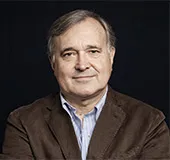 This article is part of the series — The Future of the Pandemic in 2021 and Beyond.
This article is part of the series — The Future of the Pandemic in 2021 and Beyond.
They emphatically called it “The Ski War.” Approaching at the same time as the winter season and a possible third wave of the pandemic, after a devastating second one at the end of the summer, German Chancellor
Angela Merkel was pretty clear with her Parliament, the Bunderstag: “We will push for a vote in Europe to close all ski resorts.” No mountain vacations, at least for the traditional two weeks of Christmas/New Year holiday.
The Italian PM Giuseppe Conte and the French President Emmanuel Macron convincingly agreed. But the fourth large Alpine country in the EU, Austria, did not. “This is not a European competence,” and “We will not tell France when to reopen the Louvre,” were some of the Vienna's reactions. According to
Chancellor Sebastian Kurz this was, “not a matter in which the EU should interfere.” It should, indeed. Last March, in the Austrian resort of Ischgl 600 tourists from about 40 countries were infected, spreading the virus at home. Our borders are so close, the interactions among people so large, that a common closure of the chairlifts should not be a contentious issue.
But it is far less complicated to deal with, compared to the massive challenges we are just in front of us.
In the end, even Chancellor Kurz agreed on the Christmas lockdown in the 4,000 Austrian ski resorts. But this war could easily be a tale of the complexity of the European endeavour, to keep united 27 EU countries and to build up a common future. Snow and ski are not an irrelevant matter
— the winter season ensures 4 percent of the
Austrian GDP, just a little less than the volume of the car industry in the German economy. But it is far less complicated to deal with, compared to the massive challenges we are just in front of us.
The pandemic is an awful emergency in itself: The death toll; the limitation of our individual and common liberties; and the economic earthquake on our job creation capability, on big manufacturing, and on small and medium size activities. But COVID-19 is creating an even more compelling urgency. We need to be ready to respond to powerful challenges in the post-COVID world: a radical reform of the economy, the fast mutation of global geopolitics with aggressive leading actors, and the increasing assaults to democracy and the rule of law. We have known that we need to deal with these challenges for a long while, but we expected to have more time. The pandemic accelerated and emphasised the challenge. We have to have a change now.
We need to be ready to respond to powerful challenges in the post-COVID world: a radical reform of the economy, the fast mutation of global geopolitics with aggressive leading actors, and the increasing assaults to democracy and the rule of law.
Perhaps, the war to keep the Alpine ski lifts closed is not the most genuine evidence of what the European Union is today. More consistent is “the largest
stimulus package ever,” as Bruxelles calls the €1.8 trillion Recovery Plan for Europe. The aim of the plan is to rebuild “a post-COVID Europe” focused on research and innovation, climate and digital transition and a new health programme. Also important is the Next Generation Europe: a €750 billion temporary recovery instrument to raise funds on the capital market. Last but not the least, the European Central Bank (ECB) approved a €3.5 trillion euro cheap-loans facilities. Plus, another ECB lending of €1.3 billion emergency bond-buying plan.
This super-bazooka for the continental economic recovery is vital. But its political significance is even more important. The message is: We have to get out of it together, no matter if you are richer or poorer, if you have more credits or more debts. And we have to do it because the surrounding world is changing and requires a strong Union. In the void created by the redefinition of Donald Trump’s America and his disdain for European allies, the EU has already found some space to show an unexpected assertiveness. The new economic sanctions against Belarus and Russia; the increasing focus on democracy and human rights; and the clarification of the European stance in the unproductive trade war — neither with China nor with the US’s hawkish approach, defining instead a more shaded perspective of cooperation, competition and rivalry with Beijing. China is “a strategic competitor” but at the same time a partner in global cooperation. A common foreign policy is being formed, at last.
In the void created by the redefinition of Donald Trump’s America and his disdain for European allies, the EU has already found some space to show an unexpected assertiveness.
More interesting is the dynamic of the EU with its essential all, the US. Joe Biden's victory has been an obvious relief. But as the
European Commission president Barbara von der Leyen warned, “some shift in priorities and perceptions run much deeper than one politician or administration” — hinting at China, data privacy and digital taxation, the WTO's reform, and the dispute over aircraft subsidies (Boeing against Airbus). These issues are across party lines between Republicans and Democrats. Any American administration will pressure the EU to take more responsibility for the common security. The 30 NATO members agreed to share more of the Alliance’s financial burden, allocating on Defence no less than 2 percent of their GDP. At the moment, the threshold has been reached only by eight countries. Six of them are Eastern European EU members (not all the European NATO’s affiliates are also EU members), coming from the former Soviet Warsaw Pact. It is telling evidence of the deep distrust of these countries of Putin's Russia.
During his campaign, President elect Biden floated the idea of a summit of democracies. Since it would be awkward to select the countries with the necessary requirement, in the first half of 2021, the American president will launch instead a New Transatlantic Agenda. Meanwhile, to point out a new international assertiveness, the
Financial Times said Bruxelles will offer the US a “once in generation opportunity to forge a new global alliance... and meet the strategic challenge posed by China.”
The Budapest and Warsaw opposition is over the “rule of law mechanism,” binding the distribution of the resources to EU principles such as judicial and media independence, and other common practices of a liberal democracy.
The almost friendly interaction of France, Italy and Germany with Moscow and the disdain of the Polish and the Baltics for Russia are not the only difference between the Western and Eastern members of the EU. For many, future threats to the stability of the Union come more from the latter than from China, Russia or the neo-Ottoman ambitions of Recep Erdoğan. The threat is perceived to be from the inside rather than the outside.
Hungary and Poland, the two populist “illiberal democracies” in the Hungary Victor Orbàn's definition, wanted to delay the €1.8 trillion Recovery Plan — an aid urgently needed by the EU members. The Budapest and Warsaw opposition is over the “rule of law mechanism,” binding the distribution of the resources to EU principles such as judicial and media independence, and other common practices of a liberal democracy. What the two countries called “arbitrary conditionality,” was instead a clear obligation of democracy that Hungary and Poland agreed to sign in 2004, when they become members of the Union.
The two countries behaviour plus the frequent interferences of the Visegrad Group (Czech Republic, Slovakia together with Hungary and Poland); and the lack of trust toward the EU legal system in terms of rule of law, corruption and transparency of Romania, Bulgaria, Slovenia, Croatia, are a real and present danger for the firmness and the founding values of the Union. “It's pretty clear that the American people have elected Donald Trump and Mike Pence for four more years,” said the Prime Minister of Slovenia Janez Jansa the day after the US elections. Releasing such an embarrassing statement, Jansa was somehow influenced by the Slovenian origins of the first lady, Melania.
We are paying the price for our mistakes, and also the price of the originality and complexity (critics say hubristic, maybe correctly) of the EU social and political engineering.
Maybe the bulk of the European Union moved too fast and was not demanding enough in the membership accession. But the
raison d'etre of the European enterprise was and still is inclusion, not the opposite. After the end of the Cold War, we did not realise that two different and contrasting ambitions were at stake: the transnational purpose of the Western Europeans and the reaffirmation of national independence of the Easterners, after almost half century of Soviet control.
We are paying the price for our mistakes, and also the price of the originality and complexity (critics say hubristic, maybe correctly) of the EU social and political engineering. The pandemic has been a defining lesson and the immediate post-COVID years will give us the unique opportunity to transform the Union into a leading and functioning actor of the world stage. It's a crucial time for Europe. We will fail or we will change. There is no third option to stay the same as we were before COVID-19.
The views expressed above belong to the author(s). ORF research and analyses now available on Telegram! Click here to access our curated content — blogs, longforms and interviews.
 This article is part of the series — The Future of the Pandemic in 2021 and Beyond.
This article is part of the series — The Future of the Pandemic in 2021 and Beyond.
